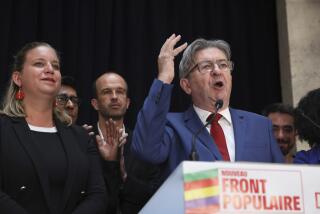Socialists Are Big Winners in French Municipal Voting
- Share via
PARIS — Lyon and Paris were swept by candidates from the political right. Marseilles fell to a maverick brain surgeon who had been expelled from the Socialist Party for not following orders.
So why was Socialist Premier Michel Rocard smiling so broadly Monday as final results of this weekend’s nationwide municipal elections were announced?
“It is a beautiful and full victory,” said Rocard.
Despite losing the three largest cities in France during the massive political exercise that concluded Sunday with a second and final round of voting, the Socialists emerged as the biggest overall winners in the 36,000 smaller towns and cities.
Much more than in the United States, city halls in France form a political foundation for higher levels of government. Many Cabinet ministers, for example, also simultaneously serve as mayors. As a result, the every-six-years municipal vote is widely interpreted as a vote of confidence for the party in power.
Recovered Lost Ground
By recording a net gain of 23 city halls among the 390 French cities with more than 20,000 population, the Socialists of Rocard and President Francois Mitterrand nearly recovered all of their losses from the disastrous 1983 municipal elections that led to a 1986 parliamentary defeat.
Perhaps more important, according to political analysts here, the Socialists were able to accomplish several other political objectives, including:
-- Expanding the Socialist Party’s image as a centrist political force, acceptable to right and left, illustrated by victories in traditionally conservative cities such as Strasbourg. Several political commentators described the elections as the first fruit for the Mitterrand-Rocard strategy of ouverture to broaden the Socialist political base and lessen the party’s dependence on its one-time Communist Party allies.
-- Continuing to isolate the Socialists’ former allies in the Communist Party by refusing to join with them in several key races. The Communists suffered a net loss of 14 important cities, including Amiens.
-- Proving that the emerging power of the Ecologist (Greens) Party is not necessarily a threat to Socialist candidates. The Socialists won in Strasbourg despite the strong showing there by an Ecologist candidate. In other cities, the Socialists and the Ecologists reached electoral agreements.
-- Effectively using the extreme right-wing National Front party to divide and disrupt the mainstream political right, notably the Gaullists, who refused to form an alliance with National Front leader Jean-Marie Le Pen but at the same time refused to condemn him.
‘Divide and Rule’
The Socialists, wrote political analysts Jean-Marie Colambani and Jean-Yves Lhomeau in the newspaper Le Monde, benefitted from “the classic strategy of divide and rule.”
In fact, one of the few right-wing heroes of the municipal elections staged his victory by taking a clear stance against Le Pen and the National Front.
Michel Noir, 44, the upset winner in Lyon for the Rally for the Republic Party, won supporters to his side by categorically refusing any alliance with Le Pen. “Better to lose elections than to lose your soul,” he pronounced.
In Paris, former Rally presidential candidate Jacques Chirac lifted sagging conservative spirits a bit by sweeping all 20 of the city’s districts for his second straight “grand slam” of the French capital since 1983.
Socialist Party egos were humbled somewhat by a similar sweeping victory in Marseilles by dissident candidate Robert Vigouroux, a laconic brain surgeon who had earlier been expelled by the Socialists for refusing to step aside for another candidate named by the party.
But overall it was a Socialist wind that swept across France, giving the party a broader mandate than it had enjoyed before.
Of 27 cities identified as “hot points” by the conservative Le Figaro newspaper before the second round of voting, the Socialist-led leftist candidates lost only two races to the right. Right-wing parties, however, lost six of the key races to the left.
“There was no doubt that the Socialists would do better than they did in 1983,” wrote Liberation editor Serge July, “but no one could have predicted a victory this clear.”
More to Read
Sign up for Essential California
The most important California stories and recommendations in your inbox every morning.
You may occasionally receive promotional content from the Los Angeles Times.










